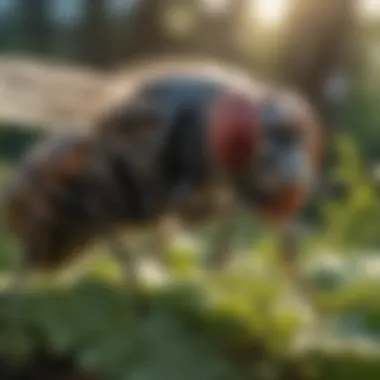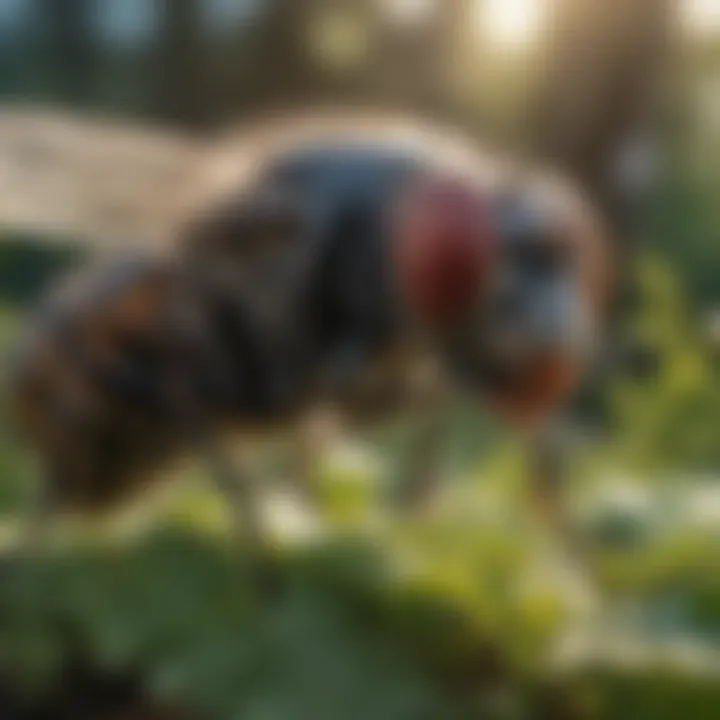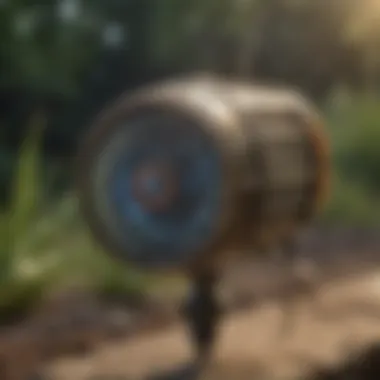Effective Strategies for Controlling Flies Outdoors: A Comprehensive Guide


Preventive Pest Control Strategies
When it comes to effectively managing outdoor fly infestations, implementing preventive pest control strategies is crucial. By addressing potential entry points and minimizing attractive environments for flies, you can significantly reduce the risk of infestations'spread throughout your living space.
House Exterior Protection
To begin, focus on safeguarding the exterior of your house. Seal any cracks or openings that may serve as entry points for pests. This thorough inspection of the perimeter can help identify vulnerable areas where flies could potentially enter. Additionally, clearing debris such as fallen leaves and wood piles around the house can deter pests from seeking shelter close to your living quarters.
Yard Maintenance
Maintaining a well-groomed yard is essential in preventing outdoor fly populations from thriving. Regularly mowing the lawn, trimming overgrown bushes, and removing standing water sources can significantly reduce the attractiveness of your yard to flies. Implementing strategies to preserve a pest-free yard not only enhances the aesthetics of your outdoor space but also minimizes the breeding grounds for flies.
Indoor Cleanliness
Maintaining cleanliness indoors is equally important in deterring flies from establishing a presence inside your home. Expert cleaning tips emphasize the importance of eliminating food residues, keeping surfaces dry, and storing food in airtight containers. By creating a pest-resistant indoor environment, you can reduce the likelihood of flies and other pests finding their way indoors.
Garbage Disposal
Efficient waste disposal methods play a critical role in outdoor fly control. Properly sealing garbage bins, disposing of organic waste promptly, and ensuring trash cans are tightly closed can help prevent flies from being attracted to your property. Proper garbage disposal not only maintains a hygienic environment but also minimizes the availability of food sources for flies.
Other Pest Prevention Strategies
Innovative approaches to safeguarding your home against pests encompass a range of techniques that complement traditional preventive measures. Utilizing natural repellents, installing barriers, and implementing proactive measures based on seasonal pest patterns can enhance the overall effectiveness of your pest control efforts.
Understanding Fly Behavior


Understanding fly behavior is a crucial aspect when it comes to effective outdoor fly control. By delving into the behavioral patterns of flies, we can better comprehend their tendencies, motivations, and preferred environments. This knowledge is key to implementing targeted control measures that disrupt and deter flies from infesting outdoor spaces.
Types of Flies Commonly Found Outdoors
Flies are a diverse group of insects, with several species commonly found outdoors including house flies, fruit flies, and blow flies. Each type of fly has distinct characteristics and behaviors, influencing their attraction to outdoor environments in varying ways. Understanding the specific types of flies present can help in tailoring control strategies to address prevalent species effectively.
Factors Attracting Flies Outside
Flies are primarily attracted to odors and visual cues such as decaying organic matter, moisture, and food sources. Outdoor spaces with uncovered garbage bins, stagnant water, and leftover food residues act as magnets for flies. By identifying and minimizing these attractants, it is possible to significantly reduce fly populations around homes and outdoor areas.
Impact of Flies on Outdoor Environments
The presence of flies in outdoor environments can lead to several negative consequences. Flies are known vectors of diseases, capable of transmitting pathogens through physical contact and contamination of surfaces. Additionally, their rapid reproductive rate can result in large infestations, causing nuisance and health hazards for individuals frequenting outdoor spaces. Understanding the potential impact of flies underscores the importance of implementing effective control measures to safeguard both human health and outdoor surroundings.
Natural Fly Control Methods
Natural fly control methods play a crucial role in addressing outdoor fly infestations. In this article, we delve into the significance of utilizing natural remedies as part of an effective fly control strategy. By opting for natural approaches, individuals can reduce reliance on harmful chemicals and contribute to a healthier environment. Natural fly control methods are known for their efficacy in repelling flies while being safer options for households, particularly those with children and pets.
Essential Oils and Herbal Repellents
Essential oils and herbal repellents are popular choices for repelling flies outdoors. Essential oils such as peppermint, citronella, and eucalyptus possess natural insect-repelling properties, making them effective in warding off flies. Herbal-based repellents like lavender or basil can also act as natural fly deterrents. These options not only help keep flies at bay but also add a pleasant aroma to outdoor spaces without the use of harsh chemicals.
Fly-Repelling Plants for Outdoor Spaces
Introducing fly-repelling plants to outdoor areas is another effective natural method for fly control. Plants like basil, mint, lavender, and marigolds are known for their ability to repel flies due to their strong scents and natural repellent properties. By strategically placing these plants around patios, entryways, or outdoor seating areas, individuals can create a natural barrier that discourages flies from lingering.
DIY Traps and Baits for Flies


DIY traps and baits offer a cost-effective and environmentally friendly way to control fly populations outdoors. Simple traps using ingredients like apple cider vinegar, sugar, and dish soap can effectively attract and trap flies. Creating bait stations using a mixture of honey and water can also help reduce fly numbers. These DIY solutions provide an accessible way for individuals to manage fly infestations without resorting to chemical-based products.
Modern Fly Control Solutions
Modern Fly Control Solutions play a crucial role in combating outdoor fly infestations effectively. In this article, emphasis is placed on integrating innovative techniques that offer efficient and practical ways to address the issue of outdoor flies. Modern solutions are designed to provide long-lasting results while minimizing the impact on the environment. By incorporating advanced technologies and techniques, readers can gain valuable insights into managing fly populations.
Electric Fly Zappers and Traps
Electric fly zappers and traps are essential components of modern fly control solutions. These devices attract flies through light or bait and then eliminate them using electric shocks or adhesive surfaces. Electric fly zappers are particularly effective for outdoor spaces as they can cover larger areas and reduce fly populations significantly. Traps, on the other hand, offer a non-toxic approach to capturing flies without the use of chemicals. They are versatile and can be strategically placed to target specific fly hotspots.
Fly Control Sprays and Ultra
Sonic Devices Fly control sprays and ultrasonic devices are also key tools in modern fly control solutions. Fly control sprays utilize insecticides or natural ingredients to repel or eliminate flies upon contact. They are easy to use and can provide quick results in reducing fly numbers. Ultrasonic devices emit sound waves that are disruptive to fly behavior, deterring them from staying in the treated area. These devices offer a chemical-free alternative for individuals concerned about environmental impact while effectively managing fly populations in outdoor spaces.
Environmental Modifications for Fly Prevention
In the realm of outdoor fly control, environmental modifications play a crucial role in deterring the presence of flies in your external spaces. By implementing specific strategies and adjustments, you can create an environment that is less conducive to fly infestations, ultimately promoting a fly-free outdoor area. These environmental modifications not only target the flies directly but also address the root causes that attract them to these spaces.
Proper Waste Management Practices
One of the fundamental components of environmental modifications for fly prevention is proper waste management. Flies are naturally drawn to areas where food sources are abundant, making waste disposal a critical aspect of controlling their population. By ensuring that all garbage is securely contained in sealed bins and promptly removed from the premises, you can significantly reduce the attractiveness of your outdoor area to flies. Additionally, implementing composting practices can further minimize organic waste that serves as a breeding ground for flies, contributing to a more hygienic environment.
Cleaning and Sanitizing Outdoor Areas
Another essential aspect of environmental modifications for fly prevention involves maintaining cleanliness and hygiene in outdoor spaces. Flies are attracted to decaying organic matter and unsanitary conditions, making regular cleaning and disinfection vital in deterring their presence. By routinely clearing debris, disposing of pet waste promptly, and sanitizing surfaces where flies may linger, you can create an inhospitable environment for these pests. Incorporating natural repellents such as vinegar-based sprays can also help repel flies while ensuring that outdoor areas remain fresh and uninviting to these pests.


Maintaining Screen Doors and Windows
In the endeavor to prevent fly infestations outdoors, the maintenance of screen doors and windows is a critical consideration. These barriers serve as primary entry points for flies into indoor spaces, making it essential to ensure that they are intact and functional. By repairing any tears or gaps in screens and sealing off potential entryways, you can limit the access points for flies and prevent them from infiltrating your living areas. Moreover, installing door sweeps and using mesh screens with a finer weave can further fortify your defenses against these pesky insects, creating a protective shield that safeguards your home from fly invasions. By prioritizing the upkeep of screen doors and windows, you can effectively bolster your fly control efforts and maintain a fly-free living environment.
Professional Pest Control Services
When it comes to achieving effective outdoor fly control, enlisting the services of professional pest control experts can be a game-changer. Professional pest control services offer a range of specialized solutions and expertise that can address even the most stubborn fly infestations. In this section, we will delve into the vital role that professional pest control services play in combating outdoor fly nuisances.
Professional pest control services bring a level of experience and knowledge that are crucial in dealing with complex fly infestations. They are equipped with the latest tools, techniques, and products specifically tailored to combat flies effectively. Whether it's identifying the species of flies present or determining the root cause of the infestation, pest control experts have the expertise to diagnose the problem accurately.
One of the key aspects emphasized in this article is the proactive approach to fly control. Professional pest control services can conduct thorough inspections of your outdoor area to assess the extent of the infestation and develop a customized treatment plan. This tailored approach ensures that the fly control solution implemented is targeted and efficient, mitigating the risk of reinfestation.
When to Seek Professional Help
Determining when to seek professional pest control services for outdoor fly management is essential in ensuring a swift and effective resolution to the problem. If you notice a significant increase in fly activity despite implementing DIY remedies or if the infestation persists over an extended period, it may be time to consider engaging professional help.
Professional pest control experts have the training and experience to handle fly infestations of varying sizes. From residential gardens to expansive outdoor areas, they can effectively eradicate flies while adhering to safety protocols and regulations. Moreover, seeking professional help early can prevent the infestation from spiraling out of control, potentially saving you time, effort, and resources in the long run.
Benefits of Hiring Pest Control Experts
There are numerous benefits to enlisting the services of pest control experts for outdoor fly management. Firstly, pest control professionals can offer long-term solutions that not only eliminate existing flies but also prevent future infestations. Their expertise allows them to identify potential entry points and breeding grounds, addressing these vulnerabilities to minimize the likelihood of recurrent fly problems.
Additionally, professional pest control services utilize safe and environmentally friendly methods to control flies. This is particularly advantageous for households with children, pets, or individuals with sensitivities to harsh chemicals. By employing targeted treatments and integrated pest management strategies, pest control experts can effectively manage fly populations without compromising the safety of residents or the environment.
Maintaining Fly-Free Outdoor Spaces
Maintaining fly-free outdoor spaces is crucial in the battle against outdoor fly invasions. By implementing effective strategies, you can ensure that your outdoor areas remain a haven free from unwanted fly activity. One of the key benefits of maintaining fly-free outdoor spaces is the promotion of a hygienic environment, reducing the risk of fly-borne diseases and contamination of food and surfaces.
Moreover, keeping outdoor spaces free of flies enhances the overall enjoyment of the area for both residents and guests. It presents a clean and inviting atmosphere, allowing individuals to relax and socialize without the nuisance of buzzing pests. Implementing proper fly control measures also reflects a sense of responsibility towards environmental hygiene and demonstrates a commitment to maintaining a healthy living environment.
When it comes to maintaining fly-free outdoor spaces, regular inspection and monitoring of fly activity play a pivotal role. By staying vigilant and assessing fly populations and breeding areas, you can identify potential infestation hotspots and take timely corrective actions. This proactive approach helps in preventing fly populations from thriving and escalating, ultimately leading to a more effective control over outdoor fly invasions.
In addition to monitoring fly activity, implementing long-term preventive measures is essential for sustainable fly control. This involves addressing underlying factors that attract flies to outdoor spaces, such as food sources, standing water, and unattended waste. By eliminating these attractants and implementing preventive measures like proper waste management, sealing entry points, and maintaining clean surroundings, you create an inhospitable environment for flies, reducing the likelihood of infestations.



